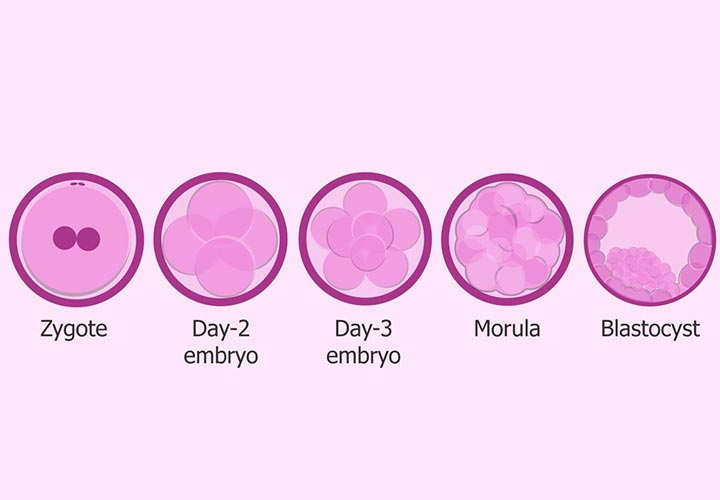In the first one week of life, the greatest concern for the zygote is the risk of development of chromosome(al) and genetic abnormalities. This risk is influenced by factors inherent in the genetic makeup of the parents and factors that influence division and multiplication of genes and chromosomes.
Genetic disorder occurs when there is an abnormality with genes and chromosomes.
Genetic disease can occur when there is either a single defective gene or a group of defective genes. A chromosome(al) or genetic disorder can also occur when there is a fault in the number and shape of chromosomes.
A common chromosomal disorder is Down’s syndrome. This occurs when a zygote has 47 chromosomes instead of the usual 46 chromosomes. In this condition, the egg is usually defective because it carries the extra chromosome.
In Down’s syndrome the extra chromosome is sited at the 21st position. Out of every 1,000 babies, one will be born with Down’s syndrome. The risk of occurrence occurring randomly but it is known to be associated with parents with genetic disorders.
Other conditions exist where an extra chromosome is added at different positions in the chromosome pair, they are known as Edward’s and Patau’s Syndrome. They are however rarer than Down’s syndrome.
These chromosome disorders are associated with physical abnormalities and mental retardation. There is increased incidence in mothers of advanced age. The risk factor is about 1 in 350 at age 35 and 1 in 125 at age 45. The incidence in 1 in 75 at age 50years. This should not be a cause of unnecessary worry for mothers of advanced age as even at age 50, out of every 25 women, 24 of the women will still escape chromosomal abnormality. This is not also to encourage late child-bearing as it is obvious that the risk of chromosomal abnormality increases with advanced age.
Another genetic disease of concern in this part of the world is sickle-cell anaemia. This occurs in 1 in 350 Nigerians. There is inheritance of defective heamoglobin from the parents by the baby. This is the commonest genetic disease of black people worldwide. When both parents are carrier of the heamoglobin trait that is they have the genotype AS, the risk of having a child with the disease is 25% but 50% when one parent has the disease and the other is a carrier that is SS and AS genotype combination.
It is therefore wise for intending couples to carry out a genotype screen before planning a family. In a situation where a couple carry genetic traits of sickle cell anaemia that will predispose their child to having sickle cell anaemia or a carrier trait, they can be counseled to have pre-implantation genetic diagnosis. This will determine the genotype of the baby before implantation. The couple will however have to resort to assisted reproductive technology to enable them determine the genotype of the baby before implantation. Prior to the use of this technology, chronic villus biopsy which involves obtaining tissue from the placenta of the fetus before 14weeks to determine the genotype was the method used in the determination of Genotype of babies suspected to have sickle cell disease while in-utero (inside the womb). This method has been taken over by pre-implantation genetic diagnosis. Overall, this method is laced about by numerous religious and human rights issues and rightly so!
Other forms of genetic disorders that will be mentioned but not discussed in details on account of their relative rarity in our environment, include Cystic fibrosis, thalassaemia, Tay-Sachs disease and others related to gender such as Hemophilia (a bleeding disorder)
Poor arrangement of chromosomes that are inherited from parents can lead to a condition known as translocation of chromosomes. In translocation the parents are normal but the child becomes abnormal if he receives the chromosome pair that is poorly arranged.
When there is abnormality related to the sex chromosomes (i.e. X and Y), it can lead to defects in sexual development of the baby, infertility and other forms of abnormality. Some example includes a situation where a female baby has only one X chromosome instead of two. This is referred to as Turner’s syndrome.
Male babies may suffer from a condition where they have two or more X chromosomes instead of one, this is referred to as Klinefelter’s syndrome it is associated with male infertility in adulthood.
The aim of this discussion is not to instill fear into you but to raise your awareness on the wide range of abnormalities that can occur early in the development of the baby and the possible risk factors.
But it is important to be reassured that far more babies are born normal rather than abnormal. As a matter of fact, normality is the rule. For babies that have inherent chromosomal and genetic abnormalities, most of these babies will suffer miscarriage and will not progress beyond the first eight-ten weeks of life. Chromosomal and genetic abnormalities are responsible for most causes of miscarriage.
My advice for you is that not everybody will need a genetic counseling, but if you have had a history of recurrent miscarriage, a child with a history of genetic or chromosomal abnormality, a child with a physical defect at birth (congenital abnormality) or if you are a blood relative of your partner (consanguinity) you may benefit from genetic counseling.






